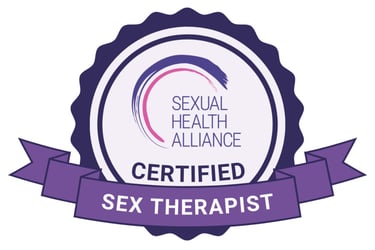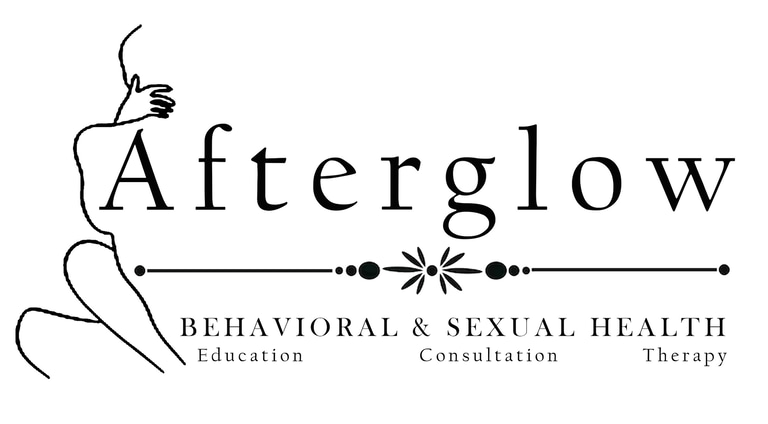Sex and Depression: A Match Made in Neurochemistry (and Possibly Heaven)
This blog explores the complicated relationship between sex and depression with humor, compassion, and science-backed insight. It breaks down how depression disrupts key mood and desire-regulating hormones like dopamine, serotonin, and oxytocin—while highlighting how sex can naturally help replenish them. The piece offers therapeutic strategies for reconnecting with intimacy during depressive episodes, including the benefits of laughter, solo pleasure, and low-pressure physical closeness. Whether you're partnered or solo, this post affirms that while sex isn’t a cure for depression, it can be powerful medicine—and a meaningful step toward healing and connection.
SEX AND MENTAL HEALTH
Dr. Kent
8/19/20254 min read


Let’s get one thing straight: when you're depressed, the idea of sex can feel about as appealing as doing your taxes in a blackout. Depression doesn't just suck the joy out of life; it also zaps the desire to connect, explore, and yes—get frisky. Suddenly, even the thought of intimacy feels like a chore instead of a release. But here’s the twist: sex might just be one of the most underutilized, overachieving mood-lifters we have. We're not saying it’s a substitute for therapy or meds (hello, we’re therapists, not idiots), but if you’re overlooking the connection between sexual activity and mental health, you’re missing out on some seriously powerful brain chemistry.
Let’s break it down with a little science, a little sass, and a whole lot of permission to reconnect with pleasure—not just as recreation, but as restoration.
Why Depression Tanks Your Sex Drive (And No, It’s Not Just You Being “Lazy”)
First, let’s lift the shame. Depression isn’t just about feeling sad—it’s about a neurochemical mutiny. Dopamine (pleasure), serotonin (mood regulation), and oxytocin (bonding) all get thrown into chaos. Think of your brain like a group chat where everyone went offline and stopped answering.
This disruption doesn’t just affect mood—it plays havoc with libido. In fact, according to a 2022 study published in The Journal of Affective Disorders, approximately 70% of people with major depressive disorder report significant sexual dysfunction. That includes reduced desire, arousal issues, and trouble reaching orgasm. So if you’ve been avoiding sex not because you don’t care, but because your body has quite literally hit the brakes—you’re not broken, you’re human.
Antidepressants can complicate things further. SSRIs, while lifesavers for many, often come with sexual side effects. The irony? You’re finally feeling well enough to consider intimacy again… only to find your parts are as enthusiastic as a bored cat.
The Orgasmic Brain: Why Sex Is a Mental Health Multivitamin
Now, let’s flip the script. Sex—especially consensual, enjoyable, connected sex—can act like a hormone smoothie for your mood. Here’s what your brain gets out of it:
Dopamine: Your brain’s “reward” hormone, released during sexual arousal and orgasm. It enhances pleasure, motivation, and that delicious sense of “I’m alive and I like it.”
Oxytocin: Known as the bonding hormone, oxytocin spikes during orgasm and affectionate touch. It reduces stress and increases feelings of trust and connection. Think of it as nature’s built-in cuddle chemical.
Serotonin: Post-orgasm, serotonin levels rise, improving mood and counteracting feelings of anxiety or despair. It’s like a neural deep breath.
Endorphins: These natural painkillers (and mood elevators) flood your system during sex, creating that mellow, floaty feeling. Less pain, more pleasure? Yes, please.
Prolactin: After climax, this hormone helps bring a sense of contentment and relaxation. It’s not just sleepiness—it’s satisfaction.
The British Medical Journal published a review in 2020 noting that “sexual activity, especially with a trusted partner, has measurable effects on depressive symptoms due to the hormonal and psychological shifts it induces.” Translation: sex is therapeutic. Not in a “wear a robe and talk about your feelings” way—more like “rewire your mood and feel like yourself again” kind of way.
How Depression-Proof Sex Might Actually Start with a Nap and a Snack
Here’s the part no one wants to admit: sometimes you have to work toward desire, not wait for it. Depression convinces us to wait for the mood to strike, but often the mood is lying in bed, eating dry cereal, and dodging phone calls. In other words, it’s not showing up.
The path back to sexual connection might not start with lingerie or scented candles—it might start with a nap, a snack, and a really honest conversation. In couples where one or both partners struggle with depression, intimacy requires patience, humor, and low-stakes exploration. Think foot rubs, warm showers together, or simply lying skin-to-skin without expectation. Build from there.
Pro tip: Schedule intimacy. Yes, that sounds about as sexy as a dental cleaning, but studies show that intimacy planning increases follow-through by up to 85% in couples managing chronic stress or mental illness. It’s not robotic—it’s realistic.
Laugh, Lube, and Let It Be Messy
Sometimes, sex during or after a depressive episode is awkward. Bodies feel foreign. Confidence is shaky. You might cry, or laugh, or fall asleep halfway through. All of that is okay. In fact, laughter and touch are healing on their own. In one 2019 meta-analysis, researchers found that humor and sexual playfulness were among the top predictors of sexual satisfaction during depressive recovery.
So, allow for imperfection. Let go of the performance, the pressure, the shoulds. If you have to pause mid-stroke to say, “Is your leg cramping or is this just interpretive dance?”—you’re doing it right.
Solo Sex Still Counts, Baby
Not partnered? Still regaining trust in intimacy? Masturbation triggers many of the same chemical rewards as partnered sex. And research confirms that regular self-pleasure is associated with lower rates of anxiety and improved body image—even in those with clinical depression. No shame, all gain.
Sex Isn’t a Cure—But It Is Medicine
Let’s be real: sex won’t cure depression. But like movement, laughter, sunshine, and therapy—it’s part of a layered, human approach to feeling whole again. And it deserves a place at the table (and maybe also on it).
So whether you're rekindling connection with a partner or learning to reconnect with your own body after a period of numbness, know this: your desire isn’t gone, it’s just waiting to be gently coaxed back to the surface. And when it does…
Light the candles, cue the playlist, toss the expectations out the window—and let the Afterglow begin.
Connect with us
© 2025. All rights reserved.
dr.kent.sexhealth@gmail.com


